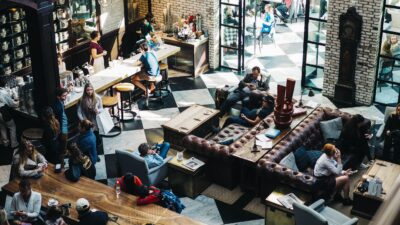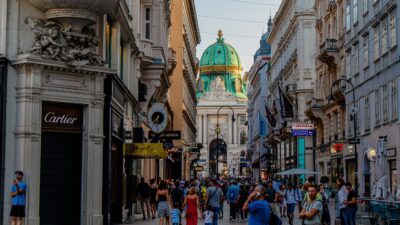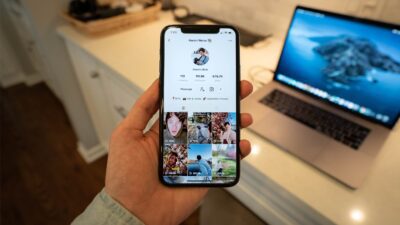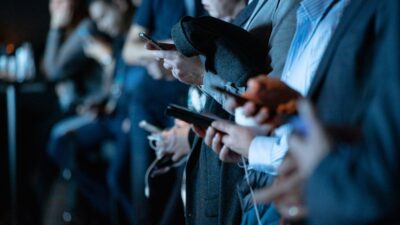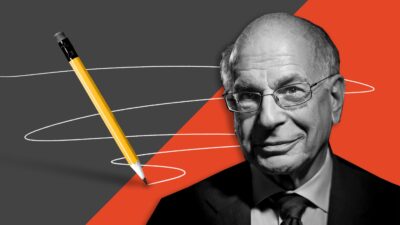Sandra Peter and Kai Riemer

Making leisure work on The Future, This Week
This week: how should we spend our time off? How making leisure time productive is making us efficient but also unhappy and what we can do about it.
Sandra Peter (Sydney Business Insights) and Kai Riemer (Digital Futures Research Group) meet once a week to put their own spin on news that is impacting the future of business in The Future, This Week.
The stories this week
07:23 – making leisure work for us
Other stories we bring up
How to manage the Great Resignation
Our previous discussion on the Great Resignation on The Future, This Week
Nissan plans to spend $17.6 billion on battery-powered vehicles over five years
Apple airtags used to steal cars
Our previous discussion of burnout on Corona Business Insights
Our previous discussion of motivation on Corona Business Insights
People think leisure is a waste of time
Be intentional about how you spend your time off
How we view free time is making us less happy
The Unlearn Project, our new podcast series on changing common sense
Follow the show on Apple Podcasts, Spotify, Overcast, Google Podcasts, Pocket Casts or wherever you get your podcasts. You can follow Sydney Business Insights on Flipboard, LinkedIn, Twitter and WeChat to keep updated with our latest insights.
Send us your news ideas to sbi@sydney.edu.au.
Music by Cinephonix.
Dr Sandra Peter is the Director of Sydney Executive Plus and Associate Professor at the University of Sydney Business School. Her research and practice focuses on engaging with the future in productive ways, and the impact of emerging technologies on business and society.
Kai Riemer is Professor of Information Technology and Organisation, and Director of Sydney Executive Plus at the University of Sydney Business School. Kai's research interest is in Disruptive Technologies, Enterprise Social Media, Virtual Work, Collaborative Technologies and the Philosophy of Technology.
Share
We believe in open and honest access to knowledge. We use a Creative Commons Attribution NoDerivatives licence for our articles and podcasts, so you can republish them for free, online or in print.
Transcript
Disclaimer We'd like to advise that the following program may contain real news, occasional philosophy and ideas that may offend some listeners.
Kai So Sandra, what are we talking about today?
Sandra We could talk about cars, Nissan decided to spend almost $20 billion on battery powered vehicles in the next five years. They're saying that by 2030, about half the vehicles that they want to sell should be at least hybrid vehicles, if not electric vehicles.
Kai That sounds to me like they're jumping on an already well-oiled bandwagon.
Sandra Well, 20 new battery powered vehicles in its line-up is a significant jump. And it was quite interesting because Nissan used to be so big early on in hybrid and electric vehicles, remember the LEAF, that was one of the first one, but then they were overtaken by companies like Tesla and Ford and Volkswagen getting on that same bandwagon. But now with a very significant investment, it looks like they want to capitalize on what was almost a decade lead in battery technology at some point.
Kai Yeah, the Nissan LEAF is actually one of the few electric cars that are not Tesla that are on the roads in Australia. It doesn't have that much of a range, but it's used by lots of local councils, and I think the University had some driving around campus. But you're right, Nissan is not known these days for hybrid, for example, where Toyota is clearly the market leader.
Sandra Although Nissan is doing interesting things in that space. It's also working to remove cobalt from its EV batteries. And we did that whole episode.
Kai We did that just then.
Sandra Just then, on cobalt. And that would also mean that they might significantly reduce the cost of those batteries, so 65% cheaper than the current LEAF generation. So an interesting space to keep an eye on.
Kai I have one about cars that isn't quite big enough for a big story, but worth mentioning. The police in Canada has reported that Apple's AirTags have been used in a number of recent car thefts.
Sandra To get them back after people stole them?
Kai No, thieves apparently, when they see a interesting, nice luxury car somewhere parked in the street, or in a parking garage, they place an AirTag in a place that isn't easily accessible in the car. And then they track the car back to an owner's driveway to go for an easy steal that is not in a public place.
Sandra Is that what you were trying to do with the Airpods the other day that were in my bag and said these are not your Airpods, and they turned out to be your Airpods?
Kai Well, you packed my Airpods.
Sandra That might have happened, yes.
Kai But that's the point. So an owner would get a notification on their phone if a foreign AirTag is traveling with them. But the police says that people might not actually know what happens with this notification. We're also fatigued have lots of notifications, people might just choose to ignore it. Or indeed, they might look for it but can't find it. So the police went public and alerted people that if they get a notification on their iPhone, of course, if they don't have an iPhone, they wouldn't know about it. But if they do, to look for it in and around their cars.
Sandra So you were trying to steal my bag.
Kai Unless you leave it out in the driveway, no.
Sandra Speaking of leaving things behind, I got very excited when I read a headline in The Economist that talked about managing the great resignation. And set aside the fact that we did this whole, whole long episode on the great resignation that's not quite the great resignation. The article promised to help us rethink retention strategies in the wake of this high staff churn that is predicted to be here to stay.
Kai And so was your excitement about this rewarded? Did you learn something worthwhile?
Sandra Well, I can tell you what the article suggests, because it's basically three big things. First, that organizations and managers should systematically gauge the retention risk that their firm faces.
Kai No kidding.
Sandra Yep. Second was managers need to pull different levers to retain different types of people. So not just salaries matter, but other things matter as well, like health care and flexibility.
Kai So not all people the same?
Sandra So not all people the same. And then thirdly, managers should plan for how to find new workers. You know, remote working is making it easier to find people in different places.
Kai That is solid advice. I'm sure managers around the world will be thrilled to read this important advice that when someone quit, they might have to hire new people.
Sandra But did it strike this chord, and I thought, but isn't this what companies think about anyway, when they think about people, you know?
Kai We don't need a great resignation to get that advice.
Sandra But then, but then, at the very end, the article did deliver and it said that the great resignation should also prompt the question that rarely gets asked, which is what is the right level of churn? And I think that might be a question that we don't ask as often. Maybe this turnover is actually a good thing. And there are some industries, some organizations where churn is expected and seen as a good thing and...
Kai Managing out and in consultancies where you do a certain time with the company. And if you're not the kind of person that progresses to become a partner, for example, they have strategies in place to manage you out to, you know, client organizations and grow their alumni network, basically.
Sandra Certain tech companies have it, albeit to stress people out, and get rid of the bottom 15%. But I think there's a lot of industries where maybe this allows people to rethink that maybe there is a right level of churn and thinking about how to move people on.
Kai So that is interesting, because we often think about churn just as in terms of a cost and a loss. But the idea to actually use this as a productive renewal, and also to have strategies in place, maybe to not retain certain types of people at certain moments, or just to think about this more strategically, that's what, what you're talking about. Well, this is an interesting thing that you could take away from this story.
Sandra But this is not the story we're gonna do today, because the one we both got hung up on, and especially with the holidays coming up, was around time off. And for those of you who know us, yes, this might be a, a surprising thing was talking about taking time off and talking about leisure time and holidays. But we think that's why it's important to do it.
Kai We're talking about leisure time, there's been articles, timely with the holidays coming up, asking questions about can we actually enjoy leisure time? What is leisure time in relation to work? So we thought we look into it.
Sandra Yeah. So let's talk about how we should spend our time off. Given this is also the last episode of...
Kai The year.
Sandra The year, yep.
Kai Let's do this.
Sandra Let's do this.
Intro From The University of Sydney Business School, this is Sydney Business Insights, an initiative that explores the future of business. And you're listening to The Future, This Week where Sandra, Peter and Kai Riemer sit down every week to rethink and unlearn trends in technology and business. They discuss the news of the week, question the obvious and explore the weird and the wonderful.
Sandra Our chat today starts with this article that we came across in The Atlantic, How Leisure Time Became Work, article that argued that the rise of the attention economy is making us all engage in leisure time as we do in work. So optimizing everything, treating our hobbies as they were work, measuring them, doing them in a data driven way.
Kai There's an increasing number of people who have certain pastimes, like watching the Bachelorette, or collecting certain items, or building water cooled computers from scratch. And instead of just enjoying these things, and keeping them to themselves, they start YouTubing about it, or Instagramming and counting things. And then these things grow into not just hobbies, but a kind of work that you know, then satisfies audiences and really gets people to do these things as if they were work with a schedule and release schedules and all this kind of stuff.
Sandra So as we're approaching the holidays, we thought we would take a look at the relationship between leisure and work. And this is quite timely, because during the COVID pandemic, we've seen many of these hobbies becoming almost work-like. There was already this implicit, or maybe explicit, idea that if you're not doing anything, you're just wasting time. So as we enter the lockdowns, people started making sourdough and learning languages and starting to play an instrument or painting or...
Kai Learning the Rubik's cube, like Megan our sound editor did. And lo and behold, a few months in, we found stories where people started complaining about the pressure of doing so. People telling each other on social media about all their exploits, the new skills they learn. And then people said, oh, you know, I feel so deficient. You know, if you haven't written a book or learned a new instrument or composed an opera, then you're really, you're really a failure. And you know, what has become of just enjoying leisure time? Does every free minute have to be filled with productive time?
Sandra So we had these few things coming together. We had this pressure to make leisure time productive, to measure how we're engaging in our leisure time, to have achievements in our leisure time. There was also the burnout that came with the pandemic with people doing actual more work, and we had an entire episode where we talked about how burnout used to be this condition that was associated with certain industries. If you were a paramedic, you would be expected to suffer from, from burnout. But that burnout became quite common across industries during the pandemic. There was the whole brain fog, and memory problems and sleep problems that got worse and worse as we spend more and more time in lockdown and with the pressures of the, of the pandemic. And so not only were people taking less time off, and there's good stats that show that people have not been taking holidays, and they've been taking fewer holidays, there was no opportunity to go anywhere during the pandemic, because we couldn't travel. And then our leisure time was scheduled to make sure that we're using it productively.
Kai Yeah, there's evidence that many people in the Western world, especially in knowledge jobs, take less and less time off. Only 14% of Americans, for example, take two weeks holiday in a row. And there's also increases in the number of unspent holidays that are never taken in 2018. That amounted to 768 million days of unused holiday that people just forego. And yes, remember, there was also all these studies that advocated for a four-day work week, which said, you know, if we reduced the number of work days, people are actually getting more productive. But what was left out in those studies was the question, what do people actually do in this additional time off, right, the assumption was that they do something that then make them more productive in the work time. But now we're getting these articles which basically show people do not enjoy leisure time. They fill leisure time with other productive activities, and they take on side hustles, or they simply are not happy when they have leisure time, because they think it's a waste of time. So I think this is a really interesting topic that we should look into.
Sandra So let's talk about this relationship between work and leisure. Because today, it seems like leisure is always defined in relation to work, it's either work to begin with, or you must unplug so that you can work better and be more efficient once you come back to work. But that wasn't always the case.
Kai Well, at least not for some people in society. So in ancient Greece, a lot of the dirty work was done by a slaves, whereas the upper classes would indulge in politics and debate and theatre, music, in philosophizing, it was only later that leisure time came to be understood in terms of you know, recuperating for work to you know, get time off of work to regain productivity during work hours.
Sandra And leisure time became associated with people who had enough wealth to afford leisure time, there were the English holidays in mainland Europe, there were the leisurely strolls.
Kai There's a German philosopher, Walter Benjamin describing people in the 1800s going for a stroll through the arcade walking a turtle on a leash, just to show how much time they had to spend on this activity.
Sandra Is this like today, people walking their very, very small designer dogs, not on the leash anymore in a pram or...
Kai But isn't that what you have a dog walker for, because you're so busy with a side hustle?
Sandra And I think that's the point, right?
Kai It is the point because this has completely flipped. In those days, just spending time on something that has no other purpose than spending that time was a signifier of social wealth. These days, many people who are quite well off, who have really high paying jobs, spend their free time on side hustles on creating more ventures being engaged in philanthropic work, but genuinely being busy.
Sandra The lack of leisure is now a status symbol. I'm so, so busy is a status symbol, like Elon Musk sleeps on his couch in his office because he has no time to do anything else.
Kai Yeah, but now we see this research coming out which raises alarm bells around the inability to enjoy leisure time, and a drop in happiness.
Sandra So a lot of the research that we came across had to do with the fact that leisure now seems to stress people out. And there were different streams of research that look at how leisure is now increasingly stressing us out. So if you're thinking now of upcoming holidays, and the next year, as we hopefully come out of COVID, stress around our leisure time seems to be significantly on the rise. And that's for a number of reasons. One is that people are, as we said, stressed about maximizing some goals, mastering something, reading something, making it to some location and making sure that they took enough Instagram pictures of the meals as they got there.
Kai Yeah, because as we said, COVID has only intensified already prevalent self-improvement ideology that has taken hold in much of society.
Sandra There also seems to be this pre-work associated with leisure time that is on the rise, you want to maximize and make your leisure time efficient. So you read all this reviews about all the places, you're going to find all the ways to get there, and all the things you can do once you get there. So diligently planning and reviewing all your pastime activities.
Kai To leave nothing to chance, which has always been part of leisure time, to not know what will happen next, to let the mind wander, to let you know, time pass by and just indulge in the moment. So we seem to not only plan out every moment of leisure time, it also raises our expectations as to what needs to happen, which leaves a lot of room for disappointment then, and stress if things do not go to plan.
Sandra There's also this tress around signalling your leisure time accomplishment. And again, we'll put links in the shownotes of research papers looking at the fact that people are moving to signalling their status and their accomplishment in domains that are not related to their work, but rather to their leisure time. Are you doing any investments? Are you landscaping? Are you baking your own sourdough at home, and have you documented this well enough so that you can display it on social media? That's stressing people out as well.
Kai And there's also perceived economic pressures as well, right?
Sandra Indeed, and again, we'll put links in the show notes, and a number of economists, including Daniel Hamermesh, have pointed to the fact that our ability to enjoy the things we can now afford to buy, so goods and services that we can buy now, our ability to purchase and enjoy them has risen much more rapidly than the time we have to do so. And that, again, puts this pressure and stress on the decisions that we make about what we choose to spend our time and our money on. So we should maybe have better experiences and see movies in higher definition or go to more expensive holiday destinations. Again, more stress on how we spend our time and our holidays.
Kai We need to bring up this study by Rutgers University, and published in the Journal of Experimental Social Psychology, which says that it really depends on people's beliefs about free time. And that people who actually have this mindset and see leisure time as a waste of time, as unproductive time, have less ability to enjoy it and are actually more stressed about it. And then also more unhappy as a result.
Sandra So what they basically showed was that if you think like leisure time and time off is wasteful, you are not getting enjoyment out of parties and things like that. And we're saying this as we're about to go to a Business School Christmas party shortly.
Kai Which is somewhat ironic or a paradox, because those who hold very strong productivity beliefs, who would think that leisure time is there to recuperate and become more productive, then have less ability to actually enjoy this leisure time to recuperate, turn it into more work to be productive in that time as well. Hence, achieving potentially the opposite being unhappy being burned out. So there's a real conundrum there with this productivity mindset when applied to the leisure time.
Sandra Okay, but this is our last episode before the holidays. So I think we should finish up on so what can we actually do to have more fun?
Kai To make the upcoming holiday period, the leisure time, more enjoyable, more productive?
Sandra No, just to have more fun. Okay. So maybe three things, right?
Kai Okay, three things is always good. That's a good start. There's some research published in HBR, which says, maybe you should embrace some goals in leisure time.
Sandra But personal goals, things like seeing friends or even organizing your closet, because it seems that does tend to make people slightly happier.
Kai So not just unstructured, not knowing what to do, but at least have a goal. Not necessarily a plan, don't treat it as a work schedule. But know what you're going to do to look forward to.
Sandra And maybe that is because people see leisure time as wasteful. So having any kind of goal or to do list does make you slightly happier. Not a lot happier, we should say, so it was about an 8% increase in happiness.
Kai And it remains a mystery how you measure this to the dots. Am I now 8% more happy because I know that I'm going to go to the Christmas party?
Sandra We'll report back on that. So first, set some personal goals. A second thing you could do is go on a holiday.
Kai And this is advice from Danny Kahneman, who you talked to recently.
Sandra Yes, his work into happiness has basically shown that experiences, so going on holidays or having experiences, have much more lasting effects on happiness than buying things or having things. Even if that thing is a new house or a new car, their effect on happiness diminishes much more quickly.
Kai Than the memories from experiences, right. And I think this is pertinent advice, especially as we're coming out of the pandemic, where, as we know from stats, many of us have shopped online.
Sandra Many, many of us have shopped a lot online.
Kai Because we couldn't go anywhere, and there was free income to spend. So ecommerce companies have done really, really well. But when buying stuff doesn't really make you happy, going away might, and as many of us are now in a position to do some limited travel, that might be the way to go.
Sandra Yeah, so set some personal goals, go on a holiday. We should have three, we always have three things.
Kai What could the third one be?
Sandra Listen to The Unlearn Project.
Kai Yeah, why not listen to a podcast, that could be a goal that you do on a holiday. So combine one, two, and three, listen to The Unlearn Project, our new podcast series about changing common sense, you might actually learn something, could be productive as well.
Sandra And in the meantime, I think the two of us should set the goal as well, because one thing we've learned from researching this episode was that there's not a really good understanding yet of leisure time and what goes into spending our leisure time well.
Kai So we might embark on some research, how about an auto ethnography on leisure time in the next few weeks?
Sandra That's research on ourselves doing leisure time. So an auto ethnography on leisure time might be a good idea. And the suggestion would also be to make the longitudinal study.
Kai We could apply to do a research project into leisure time, you know, and the effect on work. So how about a two-year project?
Sandra A longitudinal auto ethnography of leisure.
Kai I can't even pronounce that. But the point here is The Future, This Week goes on a break, we'll see you early in the next year.
Sandra In the meantime, happy holidays and thanks for listening.
Kai Oh, and listen to The Unlearn Project. Thanks for listening.
Outro This was The Future, This Week, an initiative of The University of Sydney Business School. Sandra Peter is the Director of Sydney Business Insights, and Kai Riemer is Professor of Information Technology and Organization. Connect with us on LinkedIn, Twitter and Flipboard, and subscribe, like or leave us a rating wherever you get your podcasts. If you have any weird or wonderful topics for us to discuss, send them to sbi@sydney.edu.au.
Close transcript

